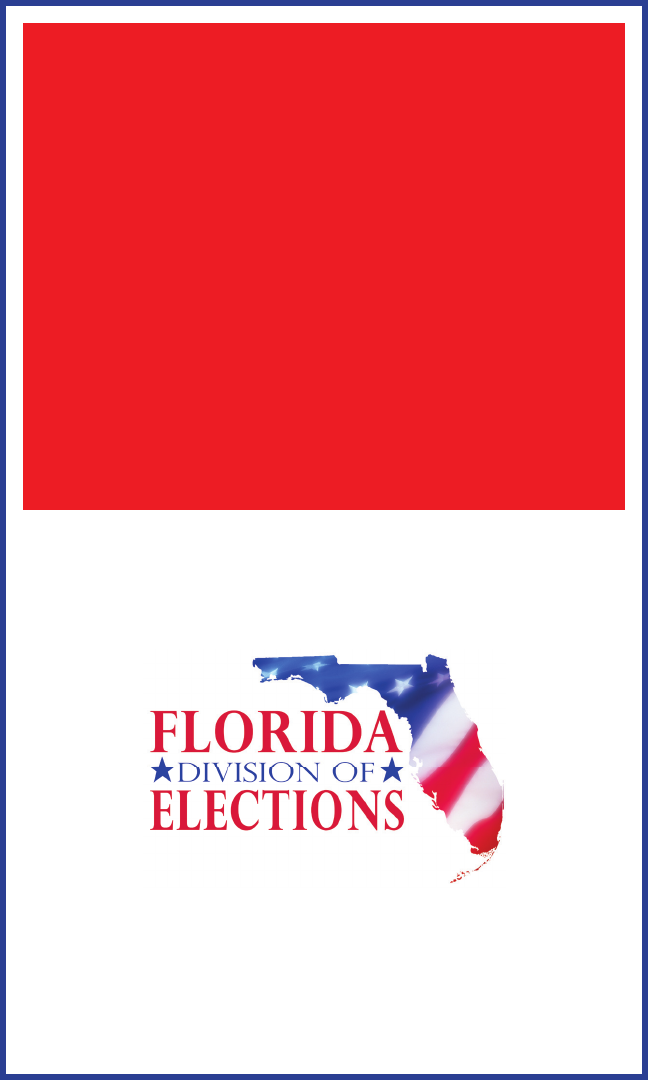
Proposed
Constitutional
Amendments and
Revisions for the
2018 General Election
Florida Department of State
Proposed Constitutional Amendments and
Revisions for the 2018 General Election
Number 1: Increased Homestead Property Tax Exemption..........1
Number 2: Limitations on Property Tax Assessments...................5
Number 3: Voter Control of Gambling in Florida.............................7
Number 4: Voting Restoration Amendment.................................10
Number 5: Supermajority Vote Required to Impose, Authorize, or
Raise State Taxes or Fees..........................................................12
Number 6: Rights of Crime Victims; Judges................................14
Number 7: First Responder and Military Member Survivor Benets;
Public Colleges and Universities................................................20
Number 8: School Board Term Limits and Duties; Public Schools
...................................................................................................24
Number 9: Prohibits Offshore Oil and Gas Drilling; Prohibits Vaping
in Enclosed Indoor Workplaces..................................................26
Number 10: State and Local Government Structure and Operation
...................................................................................................31
Number 11: Property Rights; Removal of Obsolete Provision;
Criminal Statutes.........................................................................38
Number 12: Lobbying and Abuse of Ofce by Public Ofcers......40
Number 13: Ends Dog Racing....................................................45
Note: By order of the Florida Supreme Court, NO. 8 CONSTITUTIONAL
REVISION (Ballot title: School Board Term Limits and Duties; Public Schools)
is removed from the 2018 General Election Ballot. See SC18-1368.
All other amendments (1-7 and 9-13) will appear on the ballot as numbered.

NO. 1
CONSTITUTIONAL AMENDMENT
ARTICLE VII, SECTION 6
ARTICLE XII, SECTION 37
BALLOT TITLE:
Increased Homestead Property Tax Exemption
BALLOT SUMMARY:
Proposing an amendment to the State Constitution to increase the
homestead exemption by exempting the assessed valuation of
homestead property greater than $100,000 and up to $125,000
for all levies other than school district levies. The amendment
shall take effect January 1, 2019.
FULL TEXT:
ARTICLE VII
FINANCE AND TAXATION
SECTION 6. Homestead exemptions. —
(a) Every person who has the legal or equitable title to real
estate and maintains thereon the permanent residence of the
owner, or another legally or naturally dependent upon the owner,
shall be exempt from taxation thereon, except assessments
for special benets, up to the assessed valuation of twenty-ve
thousand dollars and, for all levies other than school district
levies, on the assessed valuation greater than fty thousand
dollars and up to seventy-ve thousand dollars, and on the
assessed valuation greater than one hundred thousand dollars
and up to one hundred twenty-ve thousand dollars, upon
establishment of right thereto in the manner prescribed by law.
The real estate may be held by legal or equitable title, by the
entireties, jointly, in common, as a condominium, or indirectly
by stock ownership or membership representing the owner’s or
member’s proprietary interest in a corporation owning a fee or a
leasehold initially in excess of ninety-eight years. The exemption
shall not apply with respect to any assessment roll until such roll
Page 1
Words underlined are additions; words stricken are deletions

is rst determined to be in compliance with the provisions of
section 4 by a state agency designated by general law. This
exemption is repealed on the effective date of any amendment
to this Article which provides for the assessment of homestead
property at less than just value.
(b) Not more than one exemption shall be allowed any
individual or family unit or with respect to any residential unit.
No exemption shall exceed the value of the real estate
assessable to the owner or, in case of ownership through stock
or membership in a corporation, the value of the proportion
which the interest in the corporation bears to the assessed value
of the property.
(c) By general law and subject to conditions specied therein,
the Legislature may provide to renters, who are permanent
residents, ad valorem tax relief on all ad valorem tax levies. Such
ad valorem tax relief shall be in the form and amount established
by general law.
(d) The legislature may, by general law, allow counties or
municipalities, for the purpose of their respective tax levies and
subject to the provisions of general law, to grant either or both of
the following additional homestead tax exemptions:
(1) An exemption not exceeding fty thousand dollars to a
person who has the legal or equitable title to real estate and
maintains thereon the permanent residence of the owner, who
has attained age sixty-ve, and whose household income,
as dened by general law, does not exceed twenty thousand
dollars; or
(2) An exemption equal to the assessed value of the property
to a person who has the legal or equitable title to real estate with
a just value less than two hundred and fty thousand dollars,
as determined in the rst tax year that the owner applies and is
eligible for the exemption, and who has maintained thereon the
permanent residence of the owner for not less than twenty-ve
years, who has attained age sixty-ve, and whose household
income does not exceed the income limitation prescribed in
paragraph (1).
Page 2
Words underlined are additions; words stricken are deletions
The general law must allow counties and municipalities to grant
these additional exemptions, within the limits prescribed in this
subsection, by ordinance adopted in the manner prescribed by
general law, and must provide for the periodic adjustment of the
income limitation prescribed in this subsection for changes in the
cost of living.
(e) Each veteran who is age 65 or older who is partially or
totally permanently disabled shall receive a discount from the
amount of the ad valorem tax otherwise owed on homestead
property the veteran owns and resides in if the disability was
combat related and the veteran was honorably discharged
upon separation from military service. The discount shall
be in a percentage equal to the percentage of the veteran’s
permanent, service- connected disability as determined by the
United States Department of Veterans Affairs. To qualify for the
discount granted by this subsection, an applicant must submit
to the county property appraiser, by March 1, an ofcial letter
from the United States Department of Veterans Affairs stating
the percentage of the veteran’s service-connected disability
and such evidence that reasonably identies the disability as
combat related and a copy of the veteran’s honorable discharge.
If the property appraiser denies the request for a discount, the
appraiser must notify the applicant in writing of the reasons for
the denial, and the veteran may reapply. The Legislature may,
by general law, waive the annual application requirement in
subsequent years. This subsection is self-executing and does
not require implementing legislation.
(f) By general law and subject to conditions and limitations
specied therein, the Legislature may provide ad valorem tax
relief equal to the total amount or a portion of the ad valorem tax
otherwise owed on homestead property to:
(1) The surviving spouse of a veteran who died from service-
connected causes while on active duty as a member of the
United States Armed Forces.
(2) The surviving spouse of a rst responder who died in the
line of duty.
Page 3
Words underlined are additions; words stricken are deletions

(3) A rst responder who is totally and permanently disabled
as a result of an injury or injuries sustained in the line of duty.
Causal connection between a disability and service in the
line of duty shall not be presumed but must be determined as
provided by general law. For purposes of this paragraph, the
term “disability” does not include a chronic condition or chronic
disease, unless the injury sustained in the line of duty was the
sole cause of the chronic condition or chronic disease.
As used in this subsection and as further dened by general
law, the term “rst responder” means a law enforcement ofcer,
a correctional ofcer, a reghter, an emergency medical
technician, or a paramedic, and the term “in the line of duty”
means arising out of and in the actual performance of duty
required by employment as a rst responder.
ARTICLE XII
SCHEDULE
SECTION 37. Increased homestead exemption. —This section
and the amendment to Section 6 of Article VII increasing the
homestead exemption by exempting the assessed valuation of
homestead property greater than $100,000 and up to $125,000
for all levies other than school district levies shall take effect
January 1, 2019.
Page 4
Words underlined are additions; words stricken are deletions
NO. 2
CONSTITUTIONAL AMENDMENT
ARTICLE XII, SECTION 27
BALLOT TITLE:
Limitations on Property Tax Assessments
BALLOT SUMMARY:
Proposing an amendment to the State Constitution to
permanently retain provisions currently in effect, which limit
property tax assessment increases on specied nonhomestead
real property, except for school district taxes, to 10 percent each
year. If approved, the amendment removes the scheduled repeal
of such provisions in 2019 and shall take effect January 1, 2019.
FULL TEXT:
ARTICLE XII
SCHEDULE
SECTION 27. Property tax exemptions and limitations on
property tax assessments. —
(a) The amendments to Sections 3, 4, and 6 of Article VII,
providing a $25,000 exemption for tangible personal property,
providing an additional $25,000 homestead exemption,
authorizing transfer of the accrued benet from the limitations
on the assessment of homestead property, and this section, if
submitted to the electors of this state for approval or rejection at
a special election authorized by law to be held on January 29,
2008, shall take effect upon approval by the electors and shall
operate retroactively to January 1, 2008, or, if submitted to the
electors of this state for approval or rejection at the next general
election, shall take effect January 1 of the year following such
general election. The amendments to Section 4 of Article VII
creating subsections (g)(f) and (h)(g) of that section, creating
a limitation on annual assessment increases for specied real
property, shall take effect upon approval of the electors and shall
rst limit assessments beginning January 1, 2009, if approved at
Page 5
Words underlined are additions; words stricken are deletions

a special election held on January 29, 2008, or shall rst limit
assessments beginning January 1, 2010, if approved at the
general election held in November of 2008. Subsections (f) and
(g) of Section 4 of Article VII are repealed effective January 1,
2019; however, the legislature shall by joint resolution propose
an amendment abrogating the repeal of subsections (f) and (g),
which shall be submitted to the electors of this state for approval
or rejection at the general election of 2018 and, if approved, shall
take effect January 1, 2019.
(b) The amendment to subsection (a) abrogating the scheduled
repeal of subsections (g) and (h) of Section 4 of Article VII of the
State Constitution as it existed in 2017, shall take effect January
1, 2019.
Page 6
Words underlined are additions; words stricken are deletions
NO. 3
CONSTITUTIONAL AMENDMENT
ARTICLE X, SECTION 29
BALLOT TITLE:
Voter Control of Gambling in Florida
BALLOT SUMMARY:
This amendment ensures that Florida voters shall have the
exclusive right to decide whether to authorize casino gambling
by requiring that in order for casino gambling to be authorized
under Florida law, it must be approved by Florida voters pursuant
to Article XI, Section 3 of the Florida Constitution. Affects
articles X and XI. Denes casino gambling and claries that this
amendment does not conict with federal law regarding state/
tribal compacts.
FINANCIAL IMPACT STATEMENT:
The amendment’s impact on state and local government
revenues and costs, if any, cannot be determined at this time
because of its unknown effect on gambling operations that
have not been approved by voters through a constitutional
amendment proposed by a citizens’ initiative petition process.
FULL TEXT:
ARTICLE X, FLORIDA CONSTITUTION, is amended to include
the following new section:
Voter Control of Gambling in Florida.
(a) This amendment ensures that Florida voters shall have the
exclusive right to decide whether to authorize casino gambling
in the State of Florida. This amendment requires a vote by
citizens’ initiative pursuant to Article XI, section 3, in order for
casino gambling to be authorized under Florida law. This section
amends this Article; and also affects Article XI, by making
citizens’ initiatives the exclusive method of authorizing casino
gambling.
Page 7
Words underlined are additions; words stricken are deletions

(b) As used in this section, “casino gambling” means any of the
types of games typically found in casinos and that are within
the denition of Class III gaming in the Federal Indian Gaming
Regulatory Act, 25 U.S.C. § 2701 et seq. (“IGRA”), and in 25
C.F.R. §502.4, upon adoption of this amendment, and any that
are added to such denition of Class III gaming in the future.
This includes, but is not limited to, any house banking game,
including but not limited to card games such as baccarat, chemin
de fer, blackjack (21), and pai gow (if played as house banking
games); any player-banked game that simulates a house
banking game, such as California black jack; casino games
such as roulette, craps, and keno; any slot machines as dened
in 15 U.S.C. 1171(a)(1); and any other game not authorized by
Article X, section 15, whether or not dened as a slot machine,
in which outcomes are determined by random number generator
or are similarly assigned randomly, such as instant or historical
racing. As used herein, “casino gambling” includes any electronic
gambling devices, simulated gambling devices, video lottery
devices, internet sweepstakes devices, and any other form
of electronic or electromechanical facsimiles of any game of
chance, slot machine, or casino-style game, regardless of how
such devices are dened under IGRA. As used herein, “casino
gambling” does not include pari-mutuel wagering on horse
racing, dog racing, or jai alai exhibitions. For purposes of this
section, “gambling” and “gaming” are synonymous.
(c) Nothing herein shall be deemed to limit the right of the
Legislature to exercise its authority through general law to
restrict, regulate, or tax any gaming or gambling activities. In
addition, nothing herein shall be construed to limit the ability
of the state or Native American tribes to negotiate gaming
compacts pursuant to the Federal Indian Gaming Regulatory Act
for the conduct of casino gambling on tribal lands, or to affect
any existing gambling on tribal lands pursuant to compacts
executed by the state and Native American tribes pursuant to
IGRA.
(d) This section is effective upon approval by the voters, is self-
executing, and no Legislative implementation is required.
Page 8
Words underlined are additions; words stricken are deletions
(e) If any part of this section is held invalid for any reason, the
remaining portion or portions shall be severed from the invalid
portion and given the fullest possible force and effect.
Page 9
Words underlined are additions; words stricken are deletions

NO. 4
CONSTITUTIONAL AMENDMENT
ARTICLE VI, SECTION 4
BALLOT TITLE:
Voting Restoration Amendment
BALLOT SUMMARY:
This amendment restores the voting rights of Floridians with
felony convictions after they complete all terms of their sentence
including parole or probation. The amendment would not apply
to those convicted of murder or sexual offenses, who would
continue to be permanently barred from voting unless the
Governor and Cabinet vote to restore their voting rights on
a case by case basis.
FINANCIAL IMPACT STATEMENT:
The precise effect of this amendment on state and local
government costs cannot be determined, but the operation of
current voter registration laws, combined with an increased
number of felons registering to vote, will produce higher overall
costs relative to the processes in place today. The impact, if any,
on state and local government revenues cannot be determined.
The scal impact of any future legislation that implements a
different process cannot be reasonably determined.
FULL TEXT:
Article VI, Section 4. Disqualications.—
(a) No person convicted of a felony, or adjudicated in this or
any other state to be mentally incompetent, shall be qualied to
vote or hold ofce until restoration of civil rights or removal of
disability. Except as provided in subsection (b) of this section,
any disqualication from voting arising from a felony conviction
shall terminate and voting rights shall be restored upon
completion of all terms of sentence including parole or probation.
(b) No person convicted of murder or a felony sexual offense
shall be qualied to vote until restoration of civil rights.
Page 10
Words underlined are additions; words stricken are deletions
(bc) No person may appear on the ballot for re-election to any of
the following ofces:
(1) Florida representative,
(2) Florida senator,
(3) Florida Lieutenant governor,
(4) any ofce of the Florida cabinet,
(5) U.S. Representative from Florida, or
(6) U.S. Senator from Florida
if, by the end of the current term of ofce, the person will have
served (or, but for resignation, would have served) in that ofce
for eight consecutive years.
Page 11
Words underlined are additions; words stricken are deletions

NO. 5
CONSTITUTIONAL AMENDMENT
ARTICLE VII, SECTION 19
BALLOT TITLE:
Supermajority Vote Required to Impose, Authorize, or Raise
State Taxes or Fees
BALLOT SUMMARY:
Prohibits the legislature from imposing, authorizing, or raising a
state tax or fee except through legislation approved by a two-
thirds vote of each house of the legislature in a bill containing no
other subject. This proposal does not authorize a state tax or fee
otherwise prohibited by the Constitution and does not apply to
fees or taxes imposed or authorized to be imposed by a county,
municipality, school board, or special district.
FULL TEXT:
ARTICLE VII
FINANCE AND TAXATION
SECTION 19. Supermajority vote required to impose, authorize,
or raise state taxes or fees.—
(a) SUPERMAJORITY VOTE REQUIRED TO IMPOSE OR
AUTHORIZE NEW STATE TAX OR FEE. No new state tax or
fee may be imposed or authorized by the legislature except
through legislation approved by two-thirds of the membership of
each house of the legislature and presented to the Governor for
approval pursuant to Article III, Section 8.
(b) SUPERMAJORITY VOTE REQUIRED TO RAISE STATE
TAXES OR FEES. No state tax or fee may be raised by the
legislature except through legislation approved by two-thirds of
the membership of each house of the legislature and presented
to the Governor for approval pursuant to Article III, Section 8.
(c) APPLICABILITY. This section does not authorize the
imposition of any state tax or fee otherwise prohibited by this
Constitution, and does not apply to any tax or fee imposed by, or
Page 12
Words underlined are additions; words stricken are deletions
authorized to be imposed by, a county, municipality, school
board, or special district.
(d) DEFINITIONS. As used in this section, the following terms
shall have the following meanings:
(1) “Fee” means any charge or payment required by law,
including any fee for service, fee or cost for licenses, and charge
for service.
(2) “Raise” means:
a. To increase or authorize an increase in the rate of a state tax
or fee imposed on a percentage or per mill basis;
b. To increase or authorize an increase in the amount of a state
tax or fee imposed on a at or xed amount basis; or
c. To decrease or eliminate a state tax or fee exemption or
credit.
(e) SINGLE-SUBJECT. A state tax or fee imposed, authorized,
or raised under this section must be contained in a separate bill
that contains no other subject.
Page 13
Words underlined are additions; words stricken are deletions

NO. 6
CONSTITUTIONAL REVISION
ARTICLE I, SECTION 16
ARTICLE V, SECTIONS 8 AND 21
ARTICLE XII, NEW SECTION
BALLOT TITLE:
Rights of Crime Victims; Judges
BALLOT SUMMARY:
Creates constitutional rights for victims of crime; requires
courts to facilitate victims’ rights; authorizes victims to enforce
their rights throughout criminal and juvenile justice processes.
Requires judges and hearing ofcers to independently interpret
statutes and rules rather than deferring to government agency’s
interpretation. Raises mandatory retirement age of state
justices and judges from seventy to seventy-ve years; deletes
authorization to complete judicial term if one-half of term has
been served by retirement age.
FULL TEXT:
ARTICLE I
DECLARATION OF RIGHTS
SECTION 16. Rights of accused and of victims.—
(a) In all criminal prosecutions the accused shall, upon demand,
be informed of the nature and cause of the accusation, and
shall be furnished a copy of the charges, and shall have the
right to have compulsory process for witnesses, to confront at
trial adverse witnesses, to be heard in person, by counsel or
both, and to have a speedy and public trial by impartial jury in
the county where the crime was committed. If the county is not
known, the indictment or information may charge venue in two
or more counties conjunctively and proof that the crime was
committed in that area shall be sufcient; but before pleading the
accused may elect in which of those counties the trial will take
place. Venue for prosecution of crimes committed beyond the
Page 14
Words underlined are additions; words stricken are deletions
boundaries of the state shall be xed by law.
(b) To preserve and protect the right of crime victims to achieve
justice, ensure a meaningful role throughout the criminal and
juvenile justice systems for crime victims, and ensure that crime
victims’ rights and interests are respected and protected by
law in a manner no less vigorous than protections afforded to
criminal defendants and juvenile delinquents, every victim is
entitled to the following rights, beginning at the time of his or her
victimization:
(1) The right to due process and to be treated with fairness and
respect for the victim’s dignity.
(2) The right to be free from intimidation, harassment, and abuse.
(3) The right, within the judicial process, to be reasonably
protected from the accused and any person acting on behalf of
the accused. However, nothing contained herein is intended to
create a special relationship between the crime victim and any
law enforcement agency or ofce absent a special relationship or
duty as dened by Florida law.
(4) The right to have the safety and welfare of the victim and the
victim’s family considered when setting bail, including setting
pretrial release conditions that protect the safety and welfare of
the victim and the victim’s family.
(5) The right to prevent the disclosure of information or records
that could be used to locate or harass the victim or the victim’s
family, or which could disclose condential or privileged
information of the victim.
(6) A victim shall have the following specic rights upon request:
a. The right to reasonable, accurate, and timely notice of, and
to be present at, all public proceedings involving the criminal
conduct, including, but not limited to, trial, plea, sentencing,
or adjudication, even if the victim will be a witness at the
proceeding, notwithstanding any rule to the contrary. A victim
shall also be provided reasonable, accurate, and timely notice of
any release or escape of the defendant or delinquent, and any
proceeding during which a right of the victim is implicated.
Page 15
Words underlined are additions; words stricken are deletions

b. The right to be heard in any public proceeding involving
pretrial or other release from any form of legal constraint, plea,
sentencing, adjudication, or parole, and any proceeding during
which a right of the victim is implicated.
c. The right to confer with the prosecuting attorney concerning
any plea agreements, participation in pretrial diversion programs,
release, restitution, sentencing, or any other disposition of the
case.
d. The right to provide information regarding the impact of
the offender’s conduct on the victim and the victim’s family
to the individual responsible for conducting any presentence
investigation or compiling any presentence investigation report,
and to have any such information considered in any sentencing
recommendations submitted to the court.
e. The right to receive a copy of any presentence report, and any
other report or record relevant to the exercise of a victim’s right,
except for such portions made condential or exempt by law.
f. The right to be informed of the conviction, sentence,
adjudication, place and time of incarceration, or other disposition
of the convicted offender, any scheduled release date of the
offender, and the release of or the escape of the offender from
custody.
g. The right to be informed of all postconviction processes and
procedures, to participate in such processes and procedures,
to provide information to the release authority to be considered
before any release decision is made, and to be notied of any
release decision regarding the offender. The parole or early
release authority shall extend the right to be heard to any person
harmed by the offender.
h. The right to be informed of clemency and expungement
procedures, to provide information to the governor, the court,
any clemency board, and other authority in these procedures,
and to have that information considered before a clemency
or expungement decision is made; and to be notied of such
decision in advance of any release of the offender.
Page 16
Words underlined are additions; words stricken are deletions
(7) The rights of the victim, as provided in subparagraph (6)a.,
subparagraph (6)b., or subparagraph (6)c., that apply to any rst
appearance proceeding are satised by a reasonable attempt
by the appropriate agency to notify the victim and convey the
victim’s views to the court.
(8) The right to the prompt return of the victim’s property when no
longer needed as evidence in the case.
(9) The right to full and timely restitution in every case and from
each convicted offender for all losses suffered, both directly and
indirectly, by the victim as a result of the criminal conduct.
(10) The right to proceedings free from unreasonable delay, and
to a prompt and nal conclusion of the case and any related
postjudgment proceedings.
a. The state attorney may le a good faith demand for a speedy
trial and the trial court shall hold a calendar call, with notice,
within fteen days of the ling demand, to schedule a trial to
commence on a date at least ve days but no more than sixty
days after the date of the calendar call unless the trial judge
enters an order with specic ndings of fact justifying a trial date
more than sixty days after the calendar call.
b. All state-level appeals and collateral attacks on any judgment
must be complete within two years from the date of appeal in
non-capital cases and within ve years from the date of appeal
in capital cases, unless a court enters an order with specic
ndings as to why the court was unable to comply with this
subparagraph and the circumstances causing the delay. Each
year, the chief judge of any district court of appeal or the chief
justice of the supreme court shall report on a case-by- case
basis to the speaker of the house of representatives and the
president of the senate all cases where the court entered an
order regarding inability to comply with this subparagraph. The
legislature may enact legislation to implement this subparagraph.
(11) The right to be informed of these rights, and to be informed
that victims can seek the advice of an attorney with respect
to their rights. This information shall be made available to the
general public and provided to all crime victims in the form of a
Page 17
Words underlined are additions; words stricken are deletions

card or by other means intended to effectively advise the victim
of their rights under this section.
(c) The victim, the retained attorney of the victim, a lawful
representative of the victim, or the ofce of the state attorney
upon request of the victim, may assert and seek enforcement of
the rights enumerated in this section and any other right afforded
to a victim by law in any trial or appellate court, or before any
other authority with jurisdiction over the case, as a matter of
right. The court or other authority with jurisdiction shall act
promptly on such a request, affording a remedy by due course
of law for the violation of any right. The reasons for any decision
regarding the disposition of a victim’s right shall be clearly stated
on the record.
(d) The granting of the rights enumerated in this section to
victims may not be construed to deny or impair any other rights
possessed by victims. The provisions of this section apply
throughout criminal and juvenile justice processes, are self-
executing, and do not require implementing legislation. This
section may not be construed to create any cause of action for
damages against the state or a political subdivision of the state,
or any ofcer, employee, or agent of the state or its political
subdivisions.
(e) As used in this section, a “victim” is a person who suffers
direct or threatened physical, psychological, or nancial harm
as a result of the commission or attempted commission of a
crime or delinquent act or against whom the crime or delinquent
act is committed. The term “victim” includes the victim’s lawful
representative, the parent or guardian of a minor, or the next of
kin of a homicide victim, except upon a showing that the interest
of such individual would be in actual or potential conict with the
interests of the victim. The term “victim” does not include the
accused. The terms “crime” and “criminal” include delinquent
acts and conduct Victims of crime or their lawful representatives,
including the next of kin of homicide victims, are entitled to
the right to be informed, to be present, and to be heard when
relevant, at all crucial stages of criminal proceedings, to the extent
Page 18
Words underlined are additions; words stricken are deletions
that these rights do not interfere with the constitutional rights of
the accused.
ARTICLE V
JUDICIARY
SECTION 8. Eligibility.—No person shall be eligible for ofce of
justice or judge of any court unless the person is an elector of
the state and resides in the territorial jurisdiction of the court. No
justice or judge shall serve after attaining the age of seventy-ve
seventy years except upon temporary assignment or to complete
a term, one-half of which has been served. No person is eligible
for the ofce of justice of the supreme court or judge of a district
court of appeal unless the person is, and has been for the
preceding ten years, a member of the bar of Florida. No person
is eligible for the ofce of circuit judge unless the person is, and
has been for the preceding ve years, a member of the bar of
Florida. Unless otherwise provided by general law, no person is
eligible for the ofce of county court judge unless the person is,
and has been for the preceding ve years, a member of the bar
of Florida. Unless otherwise provided by general law, a person
shall be eligible for election or appointment to the ofce of county
court judge in a county having a population of 40,000 or less if
the person is a member in good standing of the bar of Florida.
SECTION 21. Judicial interpretation of statutes and rules.—In
interpreting a state statute or rule, a state court or an ofcer
hearing an administrative action pursuant to general law may not
defer to an administrative agency’s interpretation of such statute
or rule, and must instead interpret such statute or rule de novo.
ARTICLE XII
SCHEDULE
Eligibility of justices and judges.—The amendment to Section 8
of Article V, which increases the age at which a justice or judge
is no longer eligible to serve in judicial ofce except upon
temporary assignment, shall take effect July 1, 2019.
Page 19
Words underlined are additions; words stricken are deletions

NO. 7
CONSTITUTIONAL REVISION
ARTICLE IX, SECTIONS 7 AND 8
ARTICLE X, NEW SECTION
BALLOT TITLE:
First Responder and Military Member Survivor Benets; Public
Colleges and Universities
BALLOT SUMMARY:
Grants mandatory payment of death benets and waiver of
certain educational expenses to qualifying survivors of certain
rst responders and military members who die performing ofcial
duties. Requires supermajority votes by university trustees
and state university system board of governors to raise or
impose all legislatively authorized fees if law requires approval
by those bodies. Establishes existing state college system as
constitutional entity; provides governance structure.
FULL TEXT:
ARTICLE IX
EDUCATION
SECTION 7. State University System.—
(a) PURPOSES. In order to achieve excellence through teaching
students, advancing research and providing public service for the
benet of Florida’s citizens, their communities and economies,
the people hereby establish a system of governance for the state
university system of Florida.
(b) STATE UNIVERSITY SYSTEM. There shall be a single state
university system comprised of all public universities. A board of
trustees shall administer each public university and a board of
governors shall govern the state university system.
(c) LOCAL BOARDS OF TRUSTEES. Each local constituent
university shall be administered by a board of trustees consisting
of thirteen members dedicated to the purposes of the state
university system. The board of governors shall establish the
Page 20
Words underlined are additions; words stricken are deletions
powers and duties of the boards of trustees. Each board of
trustees shall consist of six citizen members appointed by the
governor and ve citizen members appointed by the board of
governors. The appointed members shall be conrmed by the
senate and serve staggered terms of ve years as provided
by law. The chair of the faculty senate, or the equivalent, and
the president of the student body of the university shall also be
members.
(d) STATEWIDE BOARD OF GOVERNORS. The board of
governors shall be a body corporate consisting of seventeen
members. The board shall operate, regulate, control, and be
fully responsible for the management of the whole university
system. These responsibilities shall include, but not be limited
to, dening the distinctive mission of each constituent university
and its articulation with free public schools and community
colleges, ensuring the well-planned coordination and operation
of the system, and avoiding wasteful duplication of facilities
or programs. The board’s management shall be subject to the
powers of the legislature to appropriate for the expenditure
of funds, and the board shall account for such expenditures
as provided by law. The governor shall appoint to the board
fourteen citizens dedicated to the purposes of the state university
system. The appointed members shall be conrmed by the
senate and serve staggered terms of seven years as provided
by law. The commissioner of education, the chair of the advisory
council of faculty senates, or the equivalent, and the president of
the Florida student association, or the equivalent, shall also be
members of the board.
(e) FEES. Any proposal or action of a constituent university to
raise, impose, or authorize any fee, as authorized by law, must
be approved by at least nine afrmative votes of the members
of the board of trustees of the constituent university, if approval
by the board of trustees is required by general law, and at
least twelve afrmative votes of the members of the board of
governors, if approval by the board of governors is required by
general law, in order to take effect. A fee under this subsection
Page 21
Words underlined are additions; words stricken are deletions

shall not include tuition.
SECTION 8. State College System.—
(a) PURPOSES. In order to achieve excellence and to provide
access to undergraduate education to the students of this state;
to originate articulated pathways to a baccalaureate degree;
to ensure superior commitment to teaching and learning;
and to respond quickly and efciently to meet the demand of
communities by aligning certicate and degree programs with
local and regional workforce needs, the people hereby establish
a system of governance for the state college system of Florida.
(b) STATE COLLEGE SYSTEM. There shall be a single state
college system comprised of all public community and state
colleges. A local board of trustees shall govern each state
college system institution and the state board of education shall
supervise the state college system.
(c) LOCAL BOARDS OF TRUSTEES. Each state college
system institution shall be governed by a local board of trustees
dedicated to the purposes of the state college system. A member
of a board of trustees must be a resident of the service delivery
area of the college. The powers and duties of the boards
of trustees shall be provided by law. Each member shall be
appointed by the governor to staggered 4-year terms, subject to
conrmation by the senate.
(d) ROLE OF THE STATE BOARD OF EDUCATION. The state
board of education shall supervise the state college system as
provided by law.
ARTICLE X
MISCELLANEOUS
Death benets for survivors of rst responders and military
members.—
(a) A death benet shall be paid by the employing agency when
a reghter; a paramedic; an emergency medical technician; a
law enforcement, correctional, or correctional probation ofcer; or a
Page 22
Words underlined are additions; words stricken are deletions
member of the Florida National Guard, while engaged in the
performance of their ofcial duties, is:
(1) Accidentally killed or receives accidental bodily injury which
results in the loss of the individual’s life, provided that such
killing is not the result of suicide and that such bodily injury is not
intentionally self-inicted; or
(2) Unlawfully and intentionally killed or dies as a result of such
unlawful and intentional act or is killed during active duty.
(b) A death benet shall be paid by funds from general revenue
when an active duty member of the United States Armed
Forces is:
(1) Accidentally killed or receives accidental bodily injury which
results in the loss of the individual’s life, provided that such
killing is not the result of suicide and that such bodily injury is not
intentionally self-inicted; or
(2) Unlawfully and intentionally killed or dies as a result of such
unlawful and intentional act or is killed during active duty.
(c) If a reghter; a paramedic; an emergency medical
technician; a law enforcement, correctional, or correctional
probation ofcer; or an active duty member of the Florida
National Guard or United States Armed Forces is accidentally
killed as specied in paragraphs (a)(1) and (b)(1), or unlawfully
and intentionally killed as specied in paragraphs (a)(2) and
(b)(2), the state shall waive certain educational expenses
that the child or spouse of the deceased rst responder or
military member incurs while obtaining a career certicate, an
undergraduate education, or a postgraduate education.
(d) An eligible rst responder must have been working for the
State of Florida or any of its political subdivisions or agencies at
the time of death. An eligible military member must have been
a resident of this state or his or her duty post must have been
within this state at the time of death.
(e) The legislature shall implement this section by general law.
(f) This section shall take effect on July 1, 2019.
Page 23
Words underlined are additions; words stricken are deletions

NO. 8
CONSTITUTIONAL REVISION
ARTICLE IX, SECTION 4, NEW SECTION
ARTICLE XII, NEW SECTION
BALLOT TITLE:
School Board Term Limits and Duties; Public Schools
BALLOT SUMMARY:
Creates a term limit of eight consecutive years for school
board members and requires the legislature to provide for the
promotion of civic literacy in public schools. Currently, district
school boards have a constitutional duty to operate, control,
and supervise all public schools. The amendment maintains a
school board’s duties to public schools it establishes, but permits
the state to operate, control, and supervise public schools not
established by the school board.
FULL TEXT:
ARTICLE IX
EDUCATION
SECTION 4. School districts; school boards.—
(a) Each county shall constitute a school district; provided,
two or more contiguous counties, upon vote of the electors of
each county pursuant to law, may be combined into one school
district. In each school district there shall be a school board
composed of ve or more members chosen by vote of the
electors in a nonpartisan election for appropriately staggered
terms of four years, as provided by law. A person may not appear
on the ballot for re-election to the ofce of school board if, by the
end of the current term of ofce, the person would have served,
or but for resignation would have served, in that ofce for eight
consecutive years.
(b) The school board shall operate, control, and supervise all
free public schools established by the district school board within
the school district and determine the rate of school district taxes
Page 24
Words underlined are additions; words stricken are deletions
within the limits prescribed herein. Two or more school districts
may operate and nance joint educational programs.
SECTION. Civic literacy.— As education is essential to the
preservation of the rights and liberties of the people, the
legislature shall provide by law for the promotion of civic literacy
in order to ensure that students enrolled in public education
understand and are prepared to exercise their rights and
responsibilities as citizens of a constitutional republic.
ARTICLE XII
SCHEDULE
Limitation on terms of ofce for members of a district school
board.- This section and the amendment to Section 4 of Article IX
imposing term limits for the terms of ofce for members of a
district school board shall take effect on the date it is approved
by the electorate, but no service in a term of ofce which
commenced prior to November 6, 2018, will be counted against
the limitation imposed by this amendment.
Page 25
Words underlined are additions; words stricken are deletions
Note: By order of the Florida Supreme Court, Revision
No. 8 has been removed from the ballot
Note: By order of the Florida Supreme Court, Revision
No. 8 has been removed from the ballot

NO. 9
CONSTITUTIONAL REVISION
ARTICLE II, SECTION 7
ARTICLE X, SECTION 20
BALLOT TITLE:
Prohibits Offshore Oil and Gas Drilling; Prohibits Vaping in
Enclosed Indoor Workplaces
BALLOT SUMMARY:
Prohibits drilling for the exploration or extraction of oil and natural
gas beneath all state-owned waters between the mean high
water line and the state’s outermost territorial boundaries. Adds
use of vapor-generating electronic devices to current prohibition
of tobacco smoking in enclosed indoor workplaces with
exceptions; permits more restrictive local vapor ordinances.
FULL TEXT:
ARTICLE II
GENERAL PROVISIONS
SECTION 7. Natural resources and scenic beauty.—
(a) It shall be the policy of the state to conserve and protect its
natural resources and scenic beauty. Adequate provision shall be
made by law for the abatement of air and water pollution and of
excessive and unnecessary noise and for the conservation and
protection of natural resources.
(b) Those in the Everglades Agricultural Area who cause water
pollution within the Everglades Protection Area or the Everglades
Agricultural Area shall be primarily responsible for paying the
costs of the abatement of that pollution. For the purposes of
this subsection, the terms “Everglades Protection Area” and
“Everglades Agricultural Area” shall have the meanings as
dened in statutes in effect on January 1, 1996.
(c) To protect the people of Florida and their environment, drilling
for exploration or extraction of oil or natural gas is prohibited on
lands beneath all state waters which have not been alienated and
Page 26
Words underlined are additions; words stricken are deletions
that lie between the mean high water line and the outermost
boundaries of the state’s territorial seas. This prohibition does
not apply to the transportation of oil and gas products produced
outside of such waters. This subsection is self-executing.
ARTICLE X
MISCELLANEOUS
SECTION 20. Workplaces without tobacco smoke or vapor.—
(a) PROHIBITION. As a Florida health initiative to protect
people from the health hazards of second-hand tobacco
smoke and vapor, tobacco smoking and the use of vapor-
generating electronic devices are is prohibited in enclosed
indoor workplaces. This section does not preclude the adoption
of ordinances that impose more restrictive regulation on the use
of vapor-generating electronic devices than is provided in this
section.
(b) EXCEPTIONS. As further explained in the denitions below,
tobacco smoking and the use of vapor-generating electronic
devices may be permitted in private residences whenever they
are not being used commercially to provide child care, adult
care, or health care, or any combination thereof; and further may
be permitted in retail tobacco shops, vapor-generating electronic
device retailers, designated smoking guest rooms at hotels
and other public lodging establishments; and stand-alone bars.
However, nothing in this section or in its implementing legislation
or regulations shall prohibit the owner, lessee, or other person in
control of the use of an enclosed indoor workplace from further
prohibiting or limiting smoking or the use of vapor-generating
electronic devices therein.
(c) DEFINITIONS. For purposes of this section, the following
words and terms shall have the stated meanings:
(1) “Smoking” means inhaling, exhaling, burning, carrying, or
possessing any lighted tobacco product, including cigarettes,
cigars, pipe tobacco, and any other lighted tobacco product.
(2) “Second-hand smoke,” also known as environmental tobacco
smoke (ETS), means smoke emitted from lighted, smoldering, or
Page 27
Words underlined are additions; words stricken are deletions

burning tobacco when the smoker is not inhaling; smoke emitted
at the mouthpiece during puff drawing; and smoke exhaled by
the smoker.
(3) “Work” means any person’s providing any employment
or employment-type service for or at the request of another
individual or individuals or any public or private entity, whether
for compensation or not, whether full or part-time, whether legally
or not. “Work” includes, without limitation, any such service
performed by an employee, independent contractor, agent,
partner, proprietor, manager, ofcer, director, apprentice, trainee,
associate, servant, volunteer, and the like.
(4) “Enclosed indoor workplace” means any place where
one or more persons engages in work, and which place is
predominantly or totally bounded on all sides and above by
physical barriers, regardless of whether such barriers consist of
or include uncovered openings, screened or otherwise partially
covered openings; or open or closed windows, jalousies, doors,
or the like. This section applies to all such enclosed indoor
workplaces without regard to whether work is occurring at any
given time.
(5) “Commercial” use of a private residence means any time
during which the owner, lessee, or other person occupying or
controlling the use of the private residence is furnishing in the
private residence, or causing or allowing to be furnished in
the private residence, child care, adult care, or health care, or
any combination thereof, and receiving or expecting to receive
compensation therefor.
(6) “Retail tobacco shop” means any enclosed indoor workplace
dedicated to or predominantly for the retail sale of tobacco,
tobacco products, and accessories for such products, in which
the sale of other products or services is merely incidental.
(7) “Designated smoking guest rooms at public lodging
establishments” means the sleeping rooms and directly
associated private areas, such as bathrooms, living rooms, and
kitchen areas, if any, rented to guests for their exclusive transient
occupancy in public lodging establishments including hotels,
motels, resort condominiums, transient apartments, transient
Page 28
Words underlined are additions; words stricken are deletions
lodging establishments, rooming houses, boarding houses,
resort dwellings, bed and breakfast inns, and the like; and
designated by the person or persons having management
authority over such public lodging establishment as rooms in
which smoking may be permitted.
(8) “Stand-alone bar” means any place of business devoted
during any time of operation predominantly or totally to serving
alcoholic beverages, intoxicating beverages, or intoxicating
liquors, or any combination thereof, for consumption on the
licensed premises; in which the serving of food, if any, is merely
incidental to the consumption of any such beverage; and that is
not located within, and does not share any common entryway or
common indoor area with, any other enclosed indoor workplace
including any business for which the sale of food or any other
product or service is more than an incidental source of gross
revenue.
(9) “Vapor-generating electronic device” means any product
that employs an electronic, a chemical, or a mechanical means
capable of producing vapor or aerosol from a nicotine product or
any other substance, including, but not limited to, an electronic
cigarette, electronic cigar, electronic cigarillo, electronic pipe,
or other similar device or product, any replacement cartridge
for such device, and any other container of a solution or other
substance intended to be used with or within an electronic
cigarette, electronic cigar, electronic cigarillo, electronic pipe, or
other similar device or product.
(10) “Vapor-generating electronic device retailer” means any
enclosed indoor workplace dedicated to or predominantly
for the retail sale of vapor-generating electronic devices and
components, parts, and accessories for such products, in which
the sale of other products or services is merely incidental.
(d) LEGISLATION. In the next regular legislative session
occurring after voter approval of this section or any amendment
to this section amendment, the Florida legislature shall adopt
legislation to implement this section and any amendment to
this section amendment in a manner consistent with its broad
purpose and stated terms, and having an effective date no later
Page 29
Words underlined are additions; words stricken are deletions

than July 1 of the year following voter approval. Such legislation
shall include, without limitation, civil penalties for violations of
this section; provisions for administrative enforcement; and the
requirement and authorization of agency rules for implementation
and enforcement. This section does not Nothing herein shall
preclude the legislature from enacting any law constituting or
allowing a more restrictive regulation of tobacco smoking or the
use of vapor-generating electronic devices than is provided in
this section.
Page 30
Words underlined are additions; words stricken are deletions
NO. 10
CONSTITUTIONAL REVISION
ARTICLE III, SECTION 3
ARTICLE IV, SECTIONS 4 AND 11
ARTICLE VIII, SECTIONS 1 AND 6
BALLOT TITLE:
State and Local Government Structure and Operation
BALLOT SUMMARY:
Requires legislature to retain department of veterans’ affairs.
Ensures election of sheriffs, property appraisers, supervisors
of elections, tax collectors, and clerks of court in all counties;
removes county charters’ ability to abolish, change term, transfer
duties, or eliminate election of these ofces. Changes annual
legislative session commencement date in even- numbered
years from March to January; removes legislature’s authorization
to x another date. Creates ofce of domestic security and
counterterrorism within department of law enforcement.
FULL TEXT:
ARTICLE III
LEGISLATURE
SECTION 3. Sessions of the legislature.—
(a) ORGANIZATION SESSIONS. On the fourteenth day following
each general election the legislature shall convene for the
exclusive purpose of organization and selection of ofcers.
(b) REGULAR SESSIONS. A regular session of the legislature
shall convene on the rst Tuesday after the rst Monday in
March of each odd-numbered year, and on the second rst
Tuesday after the rst Monday in January March, or such other
date as may be xed by law, of each even-numbered year.
(c) SPECIAL SESSIONS.
(1) The governor, by proclamation stating the purpose, may
convene the legislature in special session during which only such
legislative business may be transacted as is within the purview of
Page 31
Words underlined are additions; words stricken are deletions

the proclamation, or of a communication from the governor, or is
introduced by consent of two-thirds of the membership of each
house.
(2) A special session of the legislature may be convened as
provided by law.
(d) LENGTH OF SESSIONS. A regular session of the legislature
shall not exceed sixty consecutive days, and a special session
shall not exceed twenty consecutive days, unless extended
beyond such limit by a three-fths vote of each house. During
such an extension no new business may be taken up in either
house without the consent of two-thirds of its membership.
(e) ADJOURNMENT. Neither house shall adjourn for more than
seventy-two consecutive hours except pursuant to concurrent
resolution.
(f) ADJOURNMENT BY GOVERNOR. If, during any regular or
special session, the two houses cannot agree upon a time for
adjournment, the governor may adjourn the session sine die
or to any date within the period authorized for such session;
provided that, at least twenty-four hours before adjourning the
session, and while neither house is in recess, each house shall
be given formal written notice of the governor’s intention to do
so, and agreement reached within that period by both houses on
a time for adjournment shall prevail.
ARTICLE IV
EXECUTIVE
SECTION 4. Cabinet.—
(a) There shall be a cabinet composed of an attorney general,
a chief nancial ofcer, and a commissioner of agriculture. In
addition to the powers and duties specied herein, they shall
exercise such powers and perform such duties as may be
prescribed by law. In the event of a tie vote of the governor and
cabinet, the side on which the governor voted shall be deemed
to prevail.
(b) The attorney general shall be the chief state legal ofcer.
There is created in the ofce of the attorney general the position
Page 32
Words underlined are additions; words stricken are deletions
of statewide prosecutor. The statewide prosecutor shall have
concurrent jurisdiction with the state attorneys to prosecute
violations of criminal laws occurring or having occurred, in two
or more judicial circuits as part of a related transaction, or when
any such offense is affecting or has affected two or more judicial
circuits as provided by general law. The statewide prosecutor
shall be appointed by the attorney general from not less than
three persons nominated by the judicial nominating commission
for the supreme court, or as otherwise provided by general law.
(c) The chief nancial ofcer shall serve as the chief scal ofcer
of the state, and shall settle and approve accounts against the
state, and shall keep all state funds and securities.
(d) The commissioner of agriculture shall have supervision of
matters pertaining to agriculture except as otherwise provided
by law.
(e) The governor as chair, the chief nancial ofcer, and
the attorney general shall constitute the state board of
administration, which shall succeed to all the power, control,
and authority of the state board of administration established
pursuant to Article IX, Section 16 of the Constitution of 1885, and
which shall continue as a body at least for the life of Article XII,
Section 9(c).
(f) The governor as chair, the chief nancial ofcer, the attorney
general, and the commissioner of agriculture shall constitute
the trustees of the internal improvement trust fund and the land
acquisition trust fund as provided by law.
(g) The governor as chair, the chief nancial ofcer, the attorney
general, and the commissioner of agriculture shall constitute
the agency head of the Department of Law Enforcement. The
Ofce of Domestic Security and Counterterrorism is created
within the Department of Law Enforcement. The Ofce of
Domestic Security and Counterterrorism shall provide support
for prosecutors and federal, state, and local law enforcement
agencies that investigate or analyze information relating to
attempts or acts of terrorism or that prosecute terrorism, and
shall perform any other duties that are provided by law.
Page 33
Words underlined are additions; words stricken are deletions

SECTION 11. Department of Veterans’ Veterans Affairs.—The
legislature, by general law, shall provide for a may provide for the
establishment of the Department of Veterans’ Veterans Affairs
and prescribe its duties. The head of the department is the
governor and cabinet.
ARTICLE VIII
LOCAL GOVERNMENT
SECTION 1. Counties.—
(a) POLITICAL SUBDIVISIONS. The state shall be divided by
law into political subdivisions called counties. Counties may be
created, abolished or changed by law, with provision for payment
or apportionment of the public debt.
(b) COUNTY FUNDS. The care, custody and method of
disbursing county funds shall be provided by general law.
(c) GOVERNMENT. Pursuant to general or special law, a county
government may be established by charter which shall be
adopted, amended or repealed only upon vote of the electors of
the county in a special election called for that purpose.
(d) COUNTY OFFICERS. There shall be elected by the electors
of each county, for terms of four years, a sheriff, a tax collector,
a property appraiser, a supervisor of elections, and a clerk of the
circuit court; except, when provided by county charter or special
law approved by vote of the electors of the county, any county
ofcer may be chosen in another manner therein specied, or
any county ofce may be abolished when all the duties of the
ofce prescribed by general law are transferred to another ofce.
Unless When not otherwise provided by county charter or special
law approved by vote of the electors or pursuant to Article V,
section 16, the clerk of the circuit court shall be ex ofcio clerk
of the board of county commissioners, auditor, recorder and
custodian of all county funds. Notwithstanding subsection 6(e)
of this article, a county charter may not abolish the ofce of
a sheriff, a tax collector, a property appraiser, a supervisor of
elections, or a clerk of the circuit court; transfer the duties of
those ofcers to another ofcer or ofce; change the length of
the four-year term of ofce; or establish any manner of selection
Page 34
Words underlined are additions; words stricken are deletions
other than by election by the electors of the county.
(e) COMMISSIONERS. Except when otherwise provided by
county charter, the governing body of each county shall be
a board of county commissioners composed of ve or seven
members serving staggered terms of four years. After each
decennial census the board of county commissioners shall divide
the county into districts of contiguous territory as nearly equal in
population as practicable. One commissioner residing in each
district shall be elected as provided by law.
(f) NON-CHARTER GOVERNMENT. Counties not operating
under county charters shall have such power of self-government
as is provided by general or special law. The board of county
commissioners of a county not operating under a charter may
enact, in a manner prescribed by general law, county ordinances
not inconsistent with general or special law, but an ordinance in
conict with a municipal ordinance shall not be effective within
the municipality to the extent of such conict.
(g) CHARTER GOVERNMENT. Counties operating under county
charters shall have all powers of local self-government not
inconsistent with general law, or with special law approved by
vote of the electors. The governing body of a county operating
under a charter may enact county ordinances not inconsistent
with general law. The charter shall provide which shall prevail
in the event of conict between county and municipal ordinances.
(h) TAXES; LIMITATION. Property situate within municipalities
shall not be subject to taxation for services rendered by the
county exclusively for the benet of the property or residents
in unincorporated areas.
(i) COUNTY ORDINANCES. Each county ordinance shall be
led with the custodian of state records and shall become
effective at such time thereafter as is provided by general law.
(j) VIOLATION OF ORDINANCES. Persons violating county
ordinances shall be prosecuted and punished as provided
by law.
(k) COUNTY SEAT. In every county there shall be a county seat
at which shall be located the principal ofces and permanent
records of all county ofcers. The county seat may not be moved
Page 35
Words underlined are additions; words stricken are deletions

except as provided by general law. Branch ofces for the conduct
of county business may be established elsewhere in the county
by resolution of the governing body of the county in the manner
prescribed by law. No instrument shall be deemed recorded until
led at the county seat, or a branch ofce designated by the
governing body of the county for the recording of instruments,
according to law.
SECTION 6. Schedule to Article VIII.—
(a) This article shall replace all of Article VIII of the Constitution
of 1885, as amended, except those sections expressly retained
and made a part of this article by reference.
(b) COUNTIES; COUNTY SEATS; MUNICIPALITIES;
DISTRICTS. The status of the following items as they exist on
the date this article becomes effective is recognized and shall
be continued until changed in accordance with law: the counties
of the state; their status with respect to the legality of the sale of
intoxicating liquors, wines and beers; the method of selection of
county ofcers; the performance of municipal functions by county
ofcers; the county seats; and the municipalities and special
districts of the state, their powers, jurisdiction and government.
(c) OFFICERS TO CONTINUE IN OFFICE. Every person holding
ofce when this article becomes effective shall continue in ofce
for the remainder of the term if that ofce is not abolished. If
the ofce is abolished the incumbent shall be paid adequate
compensation, to be xed by law, for the loss of emoluments for
the remainder of the term.
(d) ORDINANCES. Local laws relating only to unincorporated
areas of a county on the effective date of this article may be
amended or repealed by county ordinance.
(e) CONSOLIDATION AND HOME RULE. Article VIII, Sections 9,
10, 11 and 24, of the Constitution of 1885, as amended, shall
remain in full force and effect as to each county affected, as
if this article had not been adopted, until that county shall
expressly adopt a charter or home rule plan pursuant to this
article. All provisions of the Metropolitan Dade County Home
Rule Charter, heretofore or hereafter adopted by the electors of
Dade County pursuant to Article VIII, Section 11, of the
Page 36
Words underlined are additions; words stricken are deletions
Constitution of 1885, as amended, shall be valid, and any
amendments to such charter shall be valid; provided that the
said provisions of such charter and the said amendments
thereto are authorized under said Article VIII, Section 11, of the
Constitution of 1885, as amended.
(f) DADE COUNTY; POWERS CONFERRED UPON
MUNICIPALITIES. To the extent not inconsistent with the
powers of existing municipalities or general law, the Metropolitan
Government of Dade County may exercise all the powers
conferred now or hereafter by general law upon municipalities.
(g) SELECTION AND DUTIES OF COUNTY OFFICERS.—
(1) Except as provided in this subsection, the amendment to
Section 1 of this article, relating to the selection and duties
of county ofcers, shall take effect January 5, 2021, but shall
govern with respect to the qualifying for and the holding of the
primary and general elections for county constitutional ofcers
in 2020.
(2) For Miami-Dade County and Broward County, the
amendment to Section 1 of this article, relating to the selection
and duties of county ofcers, shall take effect January 7, 2025,
but shall govern with respect to the qualifying for and the holding
of the primary and general elections for county constitutional
ofcers in 2024.
(h)(g) DELETION OF OBSOLETE SCHEDULE ITEMS. The
legislature shall have power, by joint resolution, to delete
from this article any subsection of this Section 6, including
this subsection, when all events to which the subsection to
be deleted is or could become applicable have occurred. A
legislative determination of fact made as a basis for application
of this subsection shall be subject to judicial review.
Page 37
Words underlined are additions; words stricken are deletions

NO. 11
CONSTITUTIONAL REVISION
ARTICLE I, SECTION 2
ARTICLE X, SECTIONS 9 AND 19
BALLOT TITLE:
Property Rights; Removal of Obsolete Provision; Criminal
Statutes
BALLOT SUMMARY:
Removes discriminatory language related to real property
rights. Removes obsolete language repealed by voters. Deletes
provision that amendment of a criminal statute will not affect
prosecution or penalties for a crime committed before the
amendment; retains current provision allowing prosecution of
a crime committed before the repeal of a criminal statute.
FULL TEXT:
ARTICLE I
DECLARATION OF RIGHTS
SECTION 2. Basic rights.—All natural persons, female and
male alike, are equal before the law and have inalienable rights,
among which are the right to enjoy and defend life and liberty, to
pursue happiness, to be rewarded for industry, and to acquire,
possess and protect property; except that the ownership,
inheritance, disposition and possession of real property by
aliens ineligible for citizenship may be regulated or prohibited by
law. No person shall be deprived of any right because of race,
religion, national origin, or physical disability.
ARTICLE X
MISCELLANEOUS
SECTION 9. Repeal of criminal statutes.—Repeal or amendment
of a criminal statute shall not affect prosecution or punishment
for any crime previously committed before such repeal.
Page 38
Words underlined are additions; words stricken are deletions
SECTION 19. Repealed High speed ground transportation
system.—To reduce trafc congestion and provide alternatives
to the traveling public, it is hereby declared to be in the public
interest that a high speed ground transportation system
consisting of a monorail, xed guideway or magnetic levitation
system, capable of speeds in excess of 120 miles per hour,
be developed and operated in the State of Florida to provide
high speed ground transportation by innovative, efcient and
effective technologies consisting of dedicated rails or guideways
separated from motor vehicular trafc that will link the ve largest
urban areas of the State as determined by the Legislature and
provide for access to existing air and ground transportation
facilities and services. The Legislature, the Cabinet and the
Governor are hereby directed to proceed with the development
of such a system by the State and/or by a private entity pursuant
to state approval and authorization, including the acquisition
of right-of-way, the nancing of design and construction of the
system, and the operation of the system, as provided by specic
appropriation and by law, with construction to begin on or before
November 1, 2003.
Page 39
Words underlined are additions; words stricken are deletions

NO. 12
CONSTITUTIONAL REVISION
ARTICLE II, SECTION 8
ARTICLE V, SECTION 13
ARTICLE XII, NEW SECTION
BALLOT TITLE:
Lobbying and Abuse of Ofce by Public Ofcers
BALLOT SUMMARY:
Expands current restrictions on lobbying for compensation
by former public ofcers; creates restrictions on lobbying for
compensation by serving public ofcers and former justices and
judges; provides exceptions; prohibits abuse of a public position
by public ofcers and employees to obtain a personal benet.
FULL TEXT:
ARTICLE II
GENERAL PROVISIONS
SECTION 8. Ethics in government.— A public ofce is a public
trust. The people shall have the right to secure and sustain that
trust against abuse. To assure this right:
(a) All elected constitutional ofcers and candidates for such
ofces and, as may be determined by law, other public ofcers,
candidates, and employees shall le full and public disclosure of
their nancial interests.
(b) All elected public ofcers and candidates for such ofces
shall le full and public disclosure of their campaign nances.
(c) Any public ofcer or employee who breaches the public trust
for private gain and any person or entity inducing such breach
shall be liable to the state for all nancial benets obtained by
such actions. The manner of recovery and additional damages
may be provided by law.
(d) Any public ofcer or employee who is convicted of a felony
involving a breach of public trust shall be subject to forfeiture of
rights and privileges under a public retirement system or pension
plan in such manner as may be provided by law.
Page 40
Words underlined are additions; words stricken are deletions
(e) No member of the legislature or statewide elected ofcer shall
personally represent another person or entity for compensation
before the government body or agency of which the individual
was an ofcer or member for a period of two years following
vacation of ofce. No member of the legislature shall personally
represent another person or entity for compensation during term
of ofce before any state agency other than judicial tribunals.
Similar restrictions on other public ofcers and employees may
be established by law.
(f)(1) For purposes of this subsection, the term “public ofcer”
means a statewide elected ofcer, a member of the legislature,
a county commissioner, a county ofcer pursuant to Article VIII
or county charter, a school board member, a superintendent of
schools, an elected municipal ofcer, an elected special district
ofcer in a special district with ad valorem taxing authority, or
a person serving as a secretary, an executive director, or other
agency head of a department of the executive branch of state
government.
(2) A public ofcer shall not lobby for compensation on issues
of policy, appropriations, or procurement before the federal
government, the legislature, any state government body or
agency, or any political subdivision of this state, during his or her
term of ofce.
(3) A public ofcer shall not lobby for compensation on issues of
policy, appropriations, or procurement for a period of six years
after vacation of public position, as follows:
a. A statewide elected ofcer or member of the legislature
shall not lobby the legislature or any state government body
or agency.
b. A person serving as a secretary, an executive director, or
other agency head of a department of the executive branch of
state government shall not lobby the legislature, the governor,
the executive ofce of the governor, members of the cabinet, a
department that is headed by a member of the cabinet, or his or
her former department.
Page 41
Words underlined are additions; words stricken are deletions

c. A county commissioner, a county ofcer pursuant to Article
VIII or county charter, a school board member, a superintendent
of schools, an elected municipal ofcer, or an elected special
district ofcer in a special district with ad valorem taxing authority
shall not lobby his or her former agency or governing body.
(4) This subsection shall not be construed to prohibit a public
ofcer from carrying out the duties of his or her public ofce.
(5) The legislature may enact legislation to implement this
subsection, including, but not limited to, dening terms and
providing penalties for violations. Any such law shall not contain
provisions on any other subject.
(g)(f) There shall be an independent commission to conduct
investigations and make public reports on all complaints
concerning breach of public trust by public ofcers or
employees not within the jurisdiction of the judicial qualications
commission.
(h)(1)(g) A code of ethics for all state employees and nonjudicial
ofcers prohibiting conict between public duty and private
interests shall be prescribed by law.
(2) A public ofcer or public employee shall not abuse his or her
public position in order to obtain a disproportionate benet for
himself or herself; his or her spouse, children, or employer; or
for any business with which he or she contracts; in which he or
she is an ofcer, a partner, a director, or a proprietor; or in which
he or she owns an interest. The Florida Commission on Ethics
shall, by rule in accordance with statutory procedures governing
administrative rulemaking, dene the term “disproportionate
benet” and prescribe the requisite intent for nding a violation
of this prohibition for purposes of enforcing this paragraph.
Appropriate penalties shall be prescribed by law.
(i)(h) This section shall not be construed to limit disclosures and
prohibitions which may be established by law to preserve the
public trust and avoid conicts between public duties and private
interests.
(j)(i) Schedule—On the effective date of this amendment and
until changed by law:
Page 42
Words underlined are additions; words stricken are deletions
(1) Full and public disclosure of nancial interests shall mean
ling with the custodian of state records by July 1 of each year a
sworn statement showing net worth and identifying each asset
and liability in excess of $1,000 and its value together with one of
the following:
a. A copy of the person’s most recent federal income tax return;
or
b. A sworn statement which identies each separate source and
amount of income which exceeds $1,000. The forms for such
source disclosure and the rules under which they are to be led
shall be prescribed by the independent commission established
in subsection (g) (f), and such rules shall include disclosure of
secondary sources of income.
(2) Persons holding statewide elective ofces shall also le
disclosure of their nancial interests pursuant to paragraph (1)
subsection (i)(1).
(3) The independent commission provided for in subsection (g)
(f) shall mean the Florida Commission on Ethics.
ARTICLE V
JUDICIARY
SECTION 13. Ethics in the judiciary Prohibited activities.—
(a) All justices and judges shall devote full time to their judicial
duties. A justice or judge They shall not engage in the practice of
law or hold ofce in any political party.
(b) A former justice or former judge shall not lobby for
compensation on issues of policy, appropriations, or procurement
before the legislative or executive branches of state government
for a period of six years after he or she vacates his or her judicial
position. The legislature may enact legislation to implement
this subsection, including, but not limited to, dening terms and
providing penalties for violations. Any such law shall not contain
provisions on any other subject.
Page 43
Words underlined are additions; words stricken are deletions

ARTICLE XII
SCHEDULE
Prohibitions regarding lobbying for compensation and abuse
of public position by public ofcers and public employees.—
The amendments to Section 8 of Article II and Section 13 of
Article V shall take effect December 31, 2022; except that
the amendments to Section 8(h) of Article II shall take effect
December 31, 2020, and:
(a) The Florida Commission on Ethics shall, by rule, dene the
term “disproportionate benet” and prescribe the requisite intent
for nding a violation of the prohibition against abuse of public
position by October 1, 2019, as specied in Section 8(h) of
Article II.
(b) Following the adoption of rules pursuant to subsection (a),
the legislature shall enact implementing legislation establishing
penalties for violations of the prohibition against abuse of public
position to take effect December 31, 2020.
Page 44
Words underlined are additions; words stricken are deletions
NO. 13
CONSTITUTIONAL REVISION
ARTICLE X, NEW SECTION
ARTICLE XII, NEW SECTION
BALLOT TITLE:
Ends Dog Racing
BALLOT SUMMARY:
Phases out commercial dog racing in connection with wagering
by 2020. Other gaming activities are not affected.
FULL TEXT:
ARTICLE X
MISCELLANEOUS
Prohibition on racing of and wagering on greyhounds or other
dogs.-The humane treatment of animals is a fundamental value
of the people of the State of Florida. After December 31, 2020, a
person authorized to conduct gaming or pari-mutuel operations
may not race greyhounds or any member of the Canis Familiaris
subspecies in connection with any wager for money or any other
thing of value in this state, and persons in this state may not
wager money or any other thing of value on the outcome of a live
dog race occurring in this state. The failure to conduct greyhound
racing or wagering on greyhound racing after December 31,
2018, does not constitute grounds to revoke or deny renewal of
other related gaming licenses held by a person who is a licensed
greyhound permitholder on January 1, 2018, and does not affect
the eligibility of such permitholder, or such permitholder’s facility,
to conduct other pari-mutuel activities authorized by general
law. By general law, the legislature shall specify civil or criminal
penalties for violations of this section and for activities that aid or
abet violations of this section.
Page 45
Words underlined are additions; words stricken are deletions

ARTICLE XII
SCHEDULE
Prohibition on racing of or wagering on greyhounds or other
dogs.-The amendment to Article X, which prohibits the racing of
or wagering on greyhound and other dogs, and the creation of
this section, shall take effect upon the approval of the electors.
Page 46
Words underlined are additions; words stricken are deletions

Division of Elections
e R.A. Gray Building, Room 316
500 South Bronough Street
Phone: 850.245.6200
Website: dos.myorida.com/elections
Tallahassee, Florida 32399-0250
